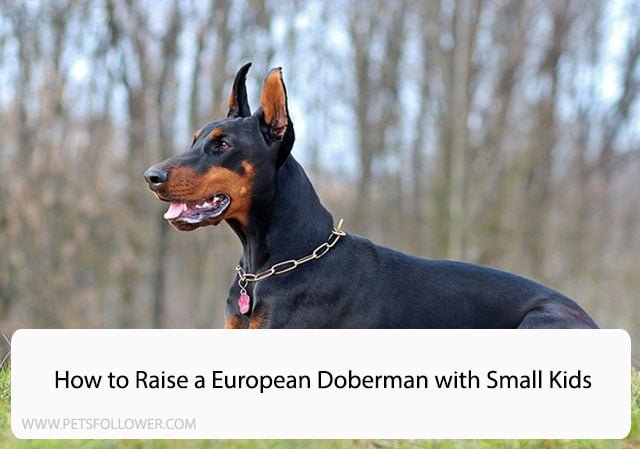
European Dobermans are great family pets because of their reputation for devotion, intelligence, and protectiveness. To create a peaceful and secure atmosphere for the dog and the kids, growing a European Doberman beside tiny children takes careful preparation and thought. This tutorial will go over seven key pointers, ranging from socialization and training to limits and monitoring, that will help you raise a European Doberman in a home with young children.
Start with Early Socialization:
For European Dobermans to form wholesome bonds with kids and other animals, early socialization is essential. From an early age, introduce your Doberman puppy to a range of situations, people, and places. This should include supervised contact with well-mannered kids. This will lessen the possibility of their developing fear or aggressiveness toward children in the future and help them learn proper behaviors and responses in various settings. If you get a properly trained puppy, they will already have been exposed to different environments and social situations, making the transition into your family much smoother. This is especially important if you’re considering getting European Doberman puppies for sale.
Establish Clear Rules and Boundaries:
To promote safety and respect between you and your European Doberman, establish clear guidelines and limits for both of them. Emphasize to your children that it’s important to treat the dog with kindness and respect and that they shouldn’t tug on its ears or tail or disturb it when it’s eating or resting. In the same vein, provide limits for your Doberman, such as certain locations where they may hide out if they need some alone time or space.
Provide Ongoing Training:
For European Dobermans to acquire obedience, etiquette, and acceptable conduct around youngsters, consistent training is necessary. Enroll your Doberman in puppy or obedience lessons so they may learn socialization techniques and fundamental instructions from a qualified trainer. Use strategies for positive reinforcement, such as praise, snacks, and prizes, to reward desirable conduct in children and to reinforce good behavior in general.
Supervise Interactions Closely:
It is important to constantly watch over how your European Doberman and young children interact in order to avoid mishaps or miscommunications. Instruct your children on how to safely and gently engage with the dog, steering clear of quick movements or loud noises that might frighten or agitate the animal. Keep an eye out for indications that your Doberman is uncomfortable or stressed, such as rigid body language, wailing, or avoidance, and take appropriate action to avoid confrontations or injury.
Teach Bite Inhibition:
European Dobermans must get bite inhibition training in order to learn how to regulate the force produced by their bites, particularly while interacting with young children. Redirect your Doberman’s focus to suitable toys or activities to prevent harsh or aggressive behavior and promote gentle mouthing during playtime. Your kids should learn to read the body language of the dog and know when to stop an encounter or give it space if they sense that the dog is uncomfortable or overstimulated.
Provide Plenty of Exercise and Mental Stimulation:
European Dobermans are lively, active dogs who need mental and physical activity on a daily basis to be healthy. Include engaging activities, walks, and playtime every day in your Doberman’s schedule to help him burn off excess energy and keep him from becoming bored or acting out. Engage your children in constructive activities such as obedience games, agility training, or fetch to improve the relationship between the animal and the kids.
Foster a Loving and Respectful Relationship:
Above all, cultivate a loving and polite bond built on mutual respect, trust, and positive reinforcement between your European Doberman with your young children. Promote friendly conversations, snuggles, and bonding moments between the children and the dog while stressing the value of compassion and understanding for animals. Instruct your kids to treat dogs with love, care, and compassion at all times and to respect their boundaries and personal space.
Conclusion
When done with compassion, empathy, and effort, raising a European Doberman with young children can be a fulfilling and enjoyable experience for everyone involved—the kids and the dog. These seven guidelines for effective integration and interaction will help you establish a peaceful, loving home where your kids and your Doberman may grow up together as people in the same family. Your European Doberman may develop into a beloved friend and devoted guardian for your kids with the right training, supervision, and direction, creating a lifetime friendship based on mutual respect, love, and trust.





